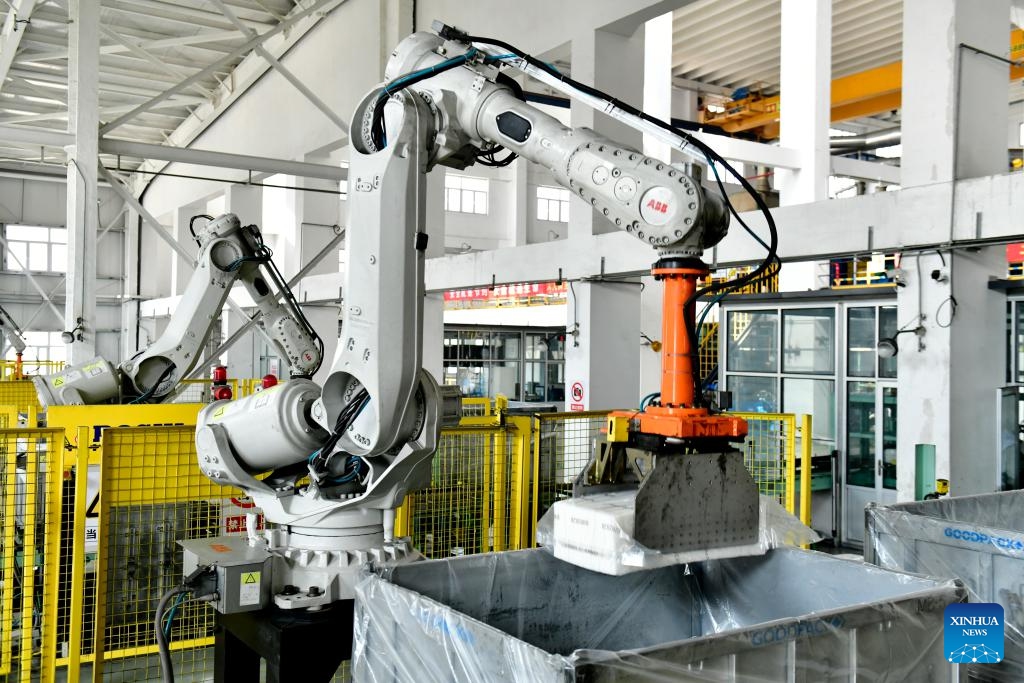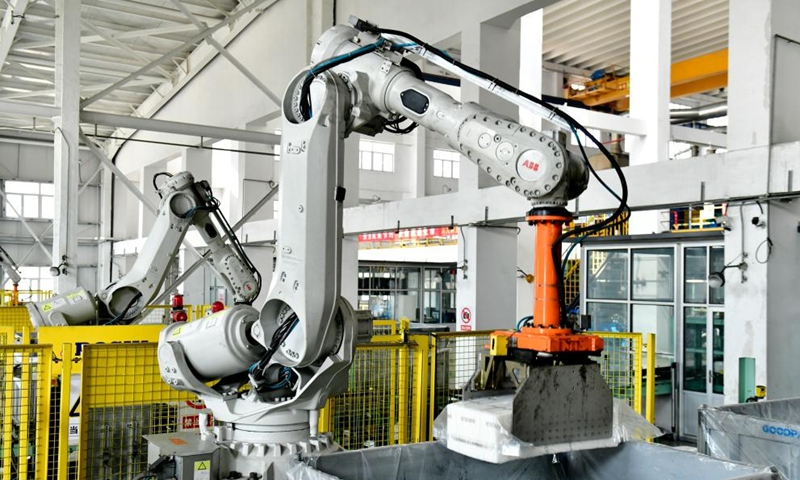
Robots package butyl rubber products at a workshop in Binzhou, east China’s Shandong Province, Feb. 26, 2025. Binzhou City is a major hub for private enterprises. In recent years, the city has fostered the development of private economy through comprehensive and end-to-end services. (Photo: Xinhua)
China’s top economic planner, the National Development and Reform Commission (NDRC), held a symposium hosted by the agency’s head Zheng Shanjie on Sunday, with private enterprises invited to submit their opinions and suggestions on expanding effective investment during the 15th Five-Year Plan period (2026-30), according to the official WeChat account of the NDRC.
The meeting reflects the government’s continued high regard for the private economy, whose importance in the national economy, including in investment and employment, is self-evident, a Chinese expert said.
At Sunday’s meeting, participating enterprises mentioned that in recent years, the government has continuously optimized the business environment, strongly supported private enterprises in investment and business development, and helped them gain more opportunities and stronger momentum for growth.
Participating enterprises suggested that when formulating the 15th Five-Year Plan, the government should further highlight the leading role of enterprises in innovation, optimize the layout and construction of science and technology innovation platforms, improve investment and financing mechanisms, and strengthen intellectual property protection, according to the NDRC.
The private business representatives also emphasized the need to support enterprises in seizing opportunities in the innovation and application of artificial intelligence, continuously expanding the investment space for private enterprises, and unleashing their investment potential.
At the same time, participating enterprises expressed their willingness to actively take part in the construction of major national projects. They also plan to focus on new technologies, new industries, new business formats, and new models to expand effective investment as a way to help better support high-quality economic and social development.
Zheng said at the symposium that private investment is an important indicator of economic vitality and plays a key role in stabilizing employment and the economy.
The official noted that China has a complete range of industrial sectors, a well-supported industrial system, and a solid foundation for economic development, with many advantages, strong resilience, and great potential. The long-term favorable conditions and basic positive trends remain unchanged, Zheng said.
He said that the opinions and suggestions put forward by enterprises will be carefully studied and incorporated into the formulation of the 15th Five-Year Plan.
This symposium once again reflected the government’s emphasis on the private economy, which makes significant contributions to investment and employment in China’s overall investment demand, Li Changan, a professor at the Academy of China Open Economy Studies at the University of International Business and Economics, told the Global Times on Sunday.
Li emphasized the private sector’s importance to the 15th Five-Year Plan, citing its increasingly critical role in the overall economy.
According to the State Administration for Market Regulation, as of May 2025, China had 185 million private enterprises, accounting for 96.76 percent of all business entities, up 2.3 percent year-on-year, the Xinhua News Agency reported.
The country has ramped up efforts to boost the private economy. China’s first fundamental law dedicated to promoting the private sector came into effect in May, strengthening legal protections and injecting fresh momentum into a key driver of the world’s second-largest economy, the Xinhua News Agency reported. This legislation marks a milestone in the development of the sector, which contributes more than 60 percent of China’s GDP.
The private sector’s performance is crucial to achieving the 15th Five-Year Plan, and its role is expected to grow as development increasingly relies on innovation, Li said, noting that rapid advances in artificial intelligence and the digital economy further underscore the sector’s importance.

